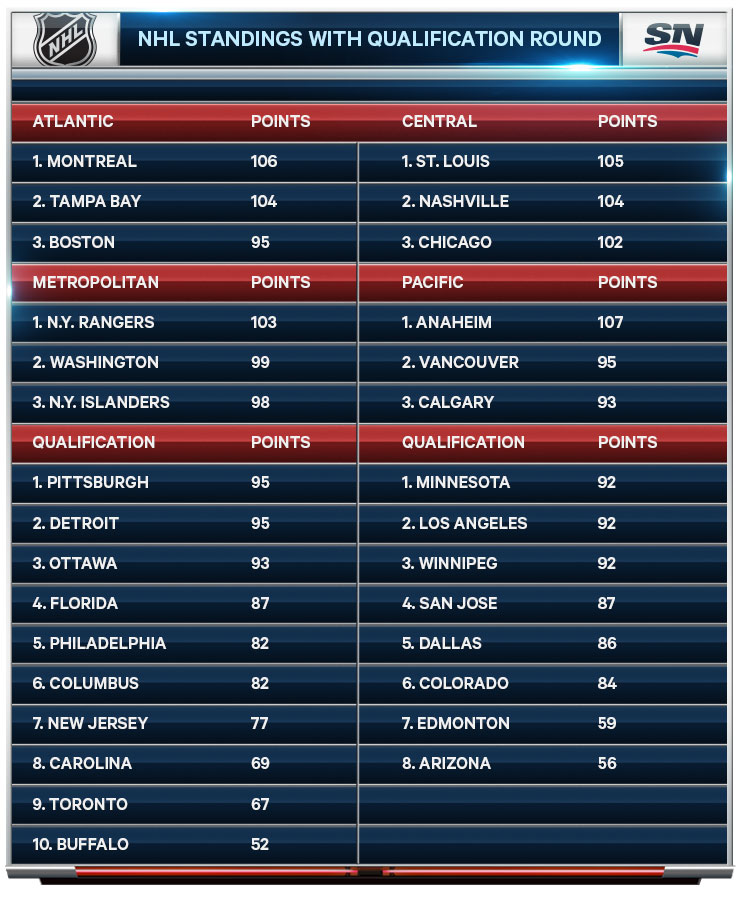There is an interesting idea that has appeared in the last two collective bargaining agreements negotiated between the NHL and the NHLPA: An expanded playoff format, which would see teams between No. 6 and No. 10 in each conference compete in a mini-tournament for the final two playoff spots on each side.
Section 16.2 of the CBA describes the format of the playoffs and includes the possibility of a best-of-three qualification round involving four teams in each Conference, with the winning teams advancing to the playoffs proper. The experiment was originally slated to take place in either 2005-06 or 2006-07.
As we know, it never happened. The new CBA includes the same language, but continues to refer to the 2005-06 and 2006-07 seasons, indicating that this wasn’t an issue which was given a lot of consideration in the last set of negotiations. Another line was held over too.
“If the League desires to implement a Playoff Qualification Round with respect to future NHL Season(s),” read both the 2005 and 2013 documents, “it may only do so with the consent of the NHLPA, which shall not be unreasonably withheld.”
Is this top of mind at NHL headquarters? Probably not. But it is a reform that the league and the players’ association could institute at some point in the future. The question is whether it’s a good idea.
On one level, the idea of expanded playoffs cheapens the whole exercise of the regular season. Already more than half of the teams in the league participate in the postseason; adding a qualification round would increase the number to two-thirds. What’s the point of an 82-game regular season when two out of three teams are going to make the playoffs anyway?
That line of reasoning misses the point, however, because a playoff qualification round actually increases the importance of the regular season in at least two ways.
First, it increases the rewards for finishing at the top of the league. This year, a team that finishes first in its division in the West can look forward to a first-round matchup with Minnesota or possibly Los Angeles. The situation isn’t much better out East; Boston currently holds one spot and the other could go to any of the Capitals, Islanders or Penguins (teams currently in a three-way race which is too close to call). Parity means that the gap between the first and fourth place teams in the division is narrower than ever.
With a qualification round, a first-place finisher would have some reward for its fine regular season. It would have a few days off to rest and rehabilitate injuries. It would draw a tired opponent in the first round and possibly even draw a lower-end team if there was an upset in the best-of-three qualification round. It would, in effect, stack the deck a little in favour of the NHL’s best teams, thereby rewarding clubs for their excellent regular season performances.
Secondly, particularly if brought in simultaneously with the Adam Gold draft system we wrote about earlier this week it would make tanking a far less appealing option.
Very few teams enter the NHL season thinking there’s no chance of finishing 10th in the conference, and it would extend the hope of not just the four new playoff teams but also all of the other clubs that still have a shot at finishing in the top 10 at the trade deadline.
Business-wise, the case seems pretty straight-forward. Teams would be in the playoff hunt longer, which in turn keeps fans engaged and buying tickets. A greater percentage of the NHL’s games would be playoff games, where ticket prices are higher.
What would the NHL standings look like if this system had been in place this year?
It’s been an odd year in the East, so the distinction between the final qualification spot and the teams on the outside is a bit wider than it normally is. In the West this year and in both conferences last year, the battle for the qualification spots is still wide open quite late in the season.
On balance, adding a qualification round would seem to do more good than harm. It rewards the best teams in the NHL by making life a little easier for them than for the bubble teams. Simultaneously it keeps fans of the league’s middle-tier engaged in the postseason race, and increases the importance of regular season performance. It’s a logical tweak to the existing system.











